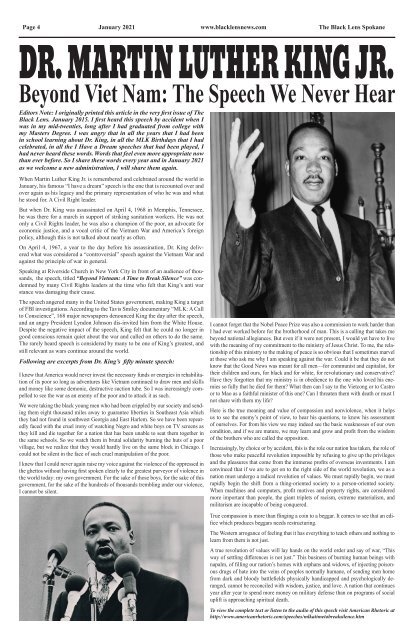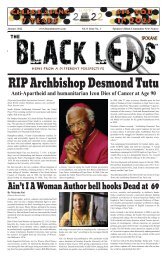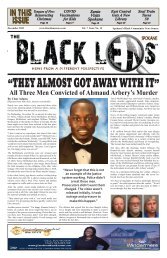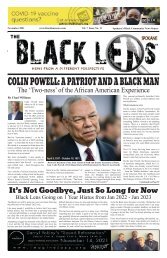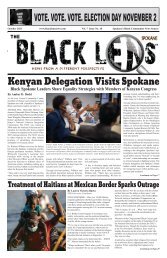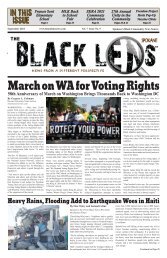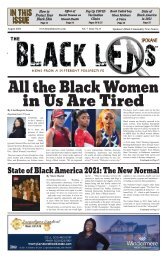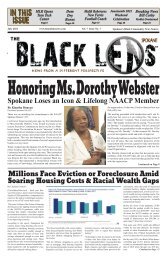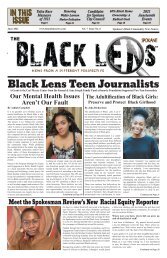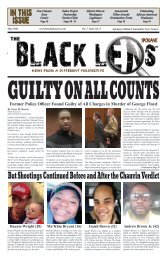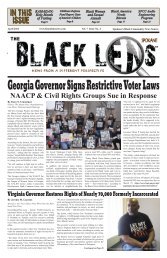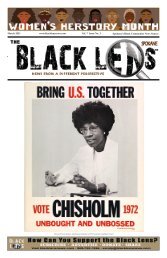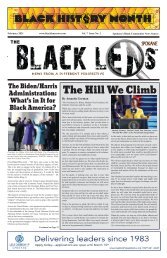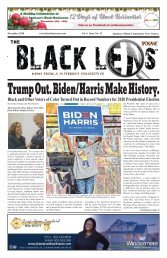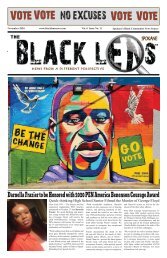Black Lens - January 2021
The Black Lens is an independent community newspaper published once a month and based in Spokane, WA that focuses on the people, issues and events that are of importance to the Black community.
The Black Lens is an independent community newspaper published once a month and based in Spokane, WA that focuses on the people, issues and events that are of importance to the Black community.
You also want an ePaper? Increase the reach of your titles
YUMPU automatically turns print PDFs into web optimized ePapers that Google loves.
Page 4<br />
<strong>January</strong> <strong>2021</strong><br />
www.blacklensnews.com<br />
The <strong>Black</strong> <strong>Lens</strong> Spokane<br />
DR. MARTIN LUTHER KING JR.<br />
Beyond Viet Nam: The Speech We Never Hear<br />
Editors Note: I originally printed this article in the very first issue of The<br />
<strong>Black</strong> <strong>Lens</strong>. <strong>January</strong> 2015. I first heard this speech by accident when I<br />
was in my mid-twenties, long after I had graduated from college with<br />
my Masters Degree. I was angry that in all the years that I had been<br />
in school learning about Dr. King, in all the MLK Birthdays that I had<br />
celebrated, in all the I Have a Dream speeches that had been played, I<br />
had never heard these words. Words that feel even more appropriate now<br />
than ever before. So I share these words every year and in <strong>January</strong> <strong>2021</strong><br />
as we welcome a new administration, I will share them again.<br />
When Martin Luther King Jr. is remembered and celebrated around the world in<br />
<strong>January</strong>, his famous “I have a dream” speech is the one that is recounted over and<br />
over again as his legacy and the primary representation of who he was and what<br />
he stood for. A Civil Right leader.<br />
But when Dr. King was assassinated on April 4, 1968 in Memphis, Tennessee,<br />
he was there for a march in support of striking sanitation workers. He was not<br />
only a Civil Rights leader, he was also a champion of the poor, an advocate for<br />
economic justice, and a vocal critic of the Vietnam War and America’s foreign<br />
policy, although this is not talked about nearly as often.<br />
On April 4, 1967, a year to the day before his assassination, Dr. King delivered<br />
what was considered a “controversial” speech against the Vietnam War and<br />
against the principle of war in general.<br />
Speaking at Riverside Church in New York City in front of an audience of thousands,<br />
the speech, titled “Beyond Vietnam: A Time to Break Silence” was condemned<br />
by many Civil Rights leaders at the time who felt that King’s anti war<br />
stance was damaging their cause.<br />
The speech angered many in the United States government, making King a target<br />
of FBI investigations. According to the Tavis Smiley documentary “MLK: A Call<br />
to Conscience”, 168 major newspapers denounced King the day after the speech,<br />
and an angry President Lyndon Johnson dis-invited him from the White House.<br />
Despite the negative impact of the speech, King felt that he could no longer in<br />
good conscious remain quiet about the war and called on others to do the same.<br />
The rarely heard speech is considered by many to be one of King’s greatest, and<br />
still relevant as wars continue around the world.<br />
Following are excerpts from Dr. King’s fifty minute speech:<br />
I knew that America would never invest the necessary funds or energies in rehabilitation<br />
of its poor so long as adventures like Vietnam continued to draw men and skills<br />
and money like some demonic, destructive suction tube. So I was increasingly compelled<br />
to see the war as an enemy of the poor and to attack it as such.<br />
We were taking the black young men who had been crippled by our society and sending<br />
them eight thousand miles away to guarantee liberties in Southeast Asia which<br />
they had not found in southwest Georgia and East Harlem. So we have been repeatedly<br />
faced with the cruel irony of watching Negro and white boys on TV screens as<br />
they kill and die together for a nation that has been unable to seat them together in<br />
the same schools. So we watch them in brutal solidarity burning the huts of a poor<br />
village, but we realize that they would hardly live on the same block in Chicago. I<br />
could not be silent in the face of such cruel manipulation of the poor.<br />
I knew that I could never again raise my voice against the violence of the oppressed in<br />
the ghettos without having first spoken clearly to the greatest purveyor of violence in<br />
the world today: my own government. For the sake of those boys, for the sake of this<br />
government, for the sake of the hundreds of thousands trembling under our violence,<br />
I cannot be silent.<br />
I cannot forget that the Nobel Peace Prize was also a commission to work harder than<br />
I had ever worked before for the brotherhood of man. This is a calling that takes me<br />
beyond national allegiances. But even if it were not present, I would yet have to live<br />
with the meaning of my commitment to the ministry of Jesus Christ. To me, the relationship<br />
of this ministry to the making of peace is so obvious that I sometimes marvel<br />
at those who ask me why I am speaking against the war. Could it be that they do not<br />
know that the Good News was meant for all men—for communist and capitalist, for<br />
their children and ours, for black and for white, for revolutionary and conservative?<br />
Have they forgotten that my ministry is in obedience to the one who loved his enemies<br />
so fully that he died for them? What then can I say to the Vietcong or to Castro<br />
or to Mao as a faithful minister of this one? Can I threaten them with death or must I<br />
not share with them my life?<br />
Here is the true meaning and value of compassion and nonviolence, when it helps<br />
us to see the enemy’s point of view, to hear his questions, to know his assessment<br />
of ourselves. For from his view we may indeed see the basic weaknesses of our own<br />
condition, and if we are mature, we may learn and grow and profit from the wisdom<br />
of the brothers who are called the opposition.<br />
Increasingly, by choice or by accident, this is the role our nation has taken, the role of<br />
those who make peaceful revolution impossible by refusing to give up the privileges<br />
and the pleasures that come from the immense profits of overseas investments. I am<br />
convinced that if we are to get on to the right side of the world revolution, we as a<br />
nation must undergo a radical revolution of values. We must rapidly begin, we must<br />
rapidly begin the shift from a thing-oriented society to a person-oriented society.<br />
When machines and computers, profit motives and property rights, are considered<br />
more important than people, the giant triplets of racism, extreme materialism, and<br />
militarism are incapable of being conquered.<br />
True compassion is more than flinging a coin to a beggar. It comes to see that an edifice<br />
which produces beggars needs restructuring.<br />
The Western arrogance of feeling that it has everything to teach others and nothing to<br />
learn from them is not just.<br />
A true revolution of values will lay hands on the world order and say of war, “This<br />
way of settling differences is not just.” This business of burning human beings with<br />
napalm, of filling our nation’s homes with orphans and widows, of injecting poisonous<br />
drugs of hate into the veins of peoples normally humane, of sending men home<br />
from dark and bloody battlefields physically handicapped and psychologically deranged,<br />
cannot be reconciled with wisdom, justice, and love. A nation that continues<br />
year after year to spend more money on military defense than on programs of social<br />
uplift is approaching spiritual death.<br />
To view the complete text or listen to the audio of this speech visit American Rhetoric at<br />
http://www.americanrhetoric.com/speeches/mlkatimetobreaksilence.htm


